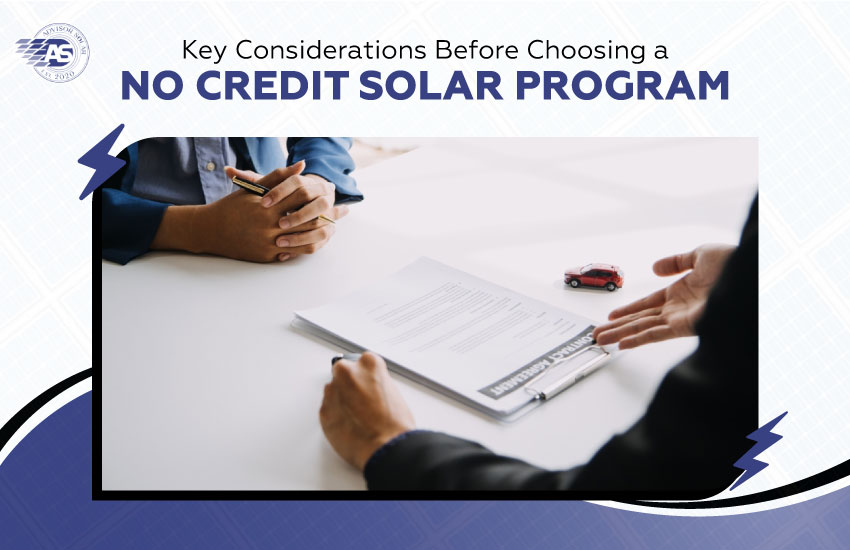Ready to transition to the clean energy future but scared your credit score will get in the way? You’re not alone! Many homeowners want to go solar but are discouraged by issues surrounding credit. The good news? No-credit solar programs are turning the tide. Even with bad credit, you could switch to solar energy if you live in New Jersey, Delaware, or Pennsylvania.
Advisor Solar, where we believe in making renewable energy affordable and accessible to homeowners without borders, in, or credit history. More than 50 percent of U.S. homeowners are eligible for no credit check financing options for solar systems, according to a National Renewable Energy Laboratory (NREL) study. That means it’s more accessible than ever to go solar!
In this guide, we’ll discuss how these no-credit solar programs work, which options are available in your state, and how you can get started saving on your energy bills today—without the headache of a credit score check.

Can You Get Solar Without a Credit Check?
Yes, you can! Many assume that good credit is a prerequisite for financing solar installations. However, no-credit solar programs let homeowners go solar without worrying about their credit scores. Many of these programs look at your home’s value and potential energy savings instead of your credit history.
No-credit solar programs aim to make solar energy accessible to a wider range of homeowners. Those that let you install solar panels and start saving money on your energy bills immediately, without the hassle of a traditional loan or financing, which usually involves a credit check.

Understanding No Credit Solar Programs
No-credit solar programs are designed to help homeowners with solar energy installations who may not qualify for conventional financing options. These programs are ways of financing solar under an alternative structure (a Power Purchase Agreement (PPA) or some form of solar leasing), and they put the focus on the savings you’ll realize by switching to solar rather than on your individual credit score.
Key Benefits of No Credit Solar Programs
- No Credit Check Required: These programs are for homeowners with bad or no credit. They typically don’t involve a credit check in the approval process.
- Lower Upfront Costs: Many of these programs enable the installation of solar panels with minimal or no upfront investment. Their main aim is to make solar energy accessible to everyone.
- Save on Energy Bills: Solar energy allows you to save money on your electricity bills from day one, as it helps cut down reliance on the grid and ultimately lowers your total energy expenses.
- Flexible Financing: No-credit solar programs can offer flexible financing, meaning you can find a plan that fits within your budget and your needs.
- Eco-Friendly: Installing solar energy drastically lowers your carbon footprint and helps create a sustainable future. Additionally, it saves you on utility bills.

No Credit Solar Options in New Jersey, Delaware, and Pennsylvania
New Jersey, Delaware, and Pennsylvania have various no-credit solar programs that will allow you to go solar now and save today!
- Power Purchase Agreements (PPAs) – Pay for Power, Not Panels
- Solar Leasing – Low Commitment, Big Savings
- State and Local Incentives for No-Credit Solar
1. Power Purchase Agreements (PPAs) – Pay for Power, Not Panels.
The Power Purchase Agreement (PPA) is one of the most popular no-credit solar options. With a power purchase agreement (PPA), you pay for your solar system’s output (electricity), not the system itself. The solar provider installs and maintains the solar panels atop your roof at no expense. In return, you agree to buy the energy they produce at a deferred cost less than what you would pay your utility company.
- No credit check: No more stress of bad or no credit.
- Immediate savings: You pay less for solar electricity and save immediately on your energy bills.
- Maintenance included: The solar provider is responsible for all maintenance and repairs of the system.
The only drawback is that you won’t own the solar panels, so you won’t be eligible for tax incentives such as the Federal Solar Tax Credit or other rebates. But the savings on your energy bills can still add up, particularly if you want a low-cost, turnkey way to dip your toe into solar.
2. Solar Leasing – Low Commitment, Big Savings
Solar leases are another great option for homeowners with bad or no credit. Under a solar lease, you would pay a fixed monthly price to lease the solar system from the provider. The provider sets up the system on your roof, and you get to use the energy it generates for a set monthly fee.
- Low or no credit requirements: Solar leasing companies typically have lower credit requirements than traditional solar loans.
- Predictable costs: You are charged a fixed amount each month, simplifying budgeting your energy costs.
- No responsibility for maintenance: Like a PPA, the solar provider maintains and repairs the system.
But as with a PPA, you won’t own the panels, so you won’t qualify for tax credits and other incentives, and transferring a lease when selling your home can sometimes be complicated.
3. State and Local Incentives for No-Credit Solar
More than 3 million U.S. homes will be powered by solar energy by 2023. U.S. solar market capacity reached an all-time high of 32.4 GWdc installed, with 6.8 GWdc within the residential segment. The residential solar market is on an upward trajectory, driven by federal and state incentives that impact the affordability of solar for homeowners, particularly those with lower credit scores. (Solar Energy Industries Association, SEIA).
Along with PPAs and solar leasing, New Jersey, Delaware, and Pennsylvania homeowners can utilize state and local incentives that reduce the cost of converting to solar energy with no credit check.
New Jersey
- Successor Solar Incentive Program (SuSI): Homeowners who install solar can earn SRECs (Solar Renewable Energy Certificates), receiving $85 for every MWh of solar energy produced. This is a fantastic way to cover installation costs and begin saving money on your solar system.
- Solar Energy Sales Tax Exemption: New Jersey has exempted solar systems from the state sales tax, lowering the total investment cost.
- Property Tax Exemption: Solar systems in New Jersey are also exempt from property taxes, so you’ll see no increase in your property taxes after installation.
- New Jersey homeowners can save an average of $18,000 throughout their solar system’s lifespan using the Successor Solar Incentive Program (SuSI) alongside federal tax credits and property tax exemptions. (SolarReviews, 2025)
Delaware
- Delaware Green Energy Program: The state programs include rebates for solar panel installation of up to $6,000. Delaware homeowners can also sell the excess energy generated by their solar system for Solar Renewable Energy Credits (SRECs), letting them turn into profit!
- Net Metering: Delaware Homeowners are allowed net metering, which means they earn credits for any excess energy produced by their solar panels, effectively lowering their energy bill.
- Delaware’s Delaware Electric Cooperative (DEC) is one such program, providing $0.50 per watt for the first 5kW installed from residential solar panels and helping homeowners (including the ones with no or low credit) offset their installation costs. (SolarSME)
Pennsylvania
- Solar Energy Program: Pennsylvania provides subsidies through local utilities and state programs. You might also be eligible for SREC programs, where you are paid additional income for your solar system.
- PACE Financing: Homeowners in Pennsylvania can qualify for property-assessed clean energy (PACE) financing, a form of low-cost financing for energy-efficient improvements, including solar panels, with little to no credit check.
- The Philadelphia Solar Rebate Program offers rebates for residential solar installations, which can help offset installation costs, with rebates up to $1,000. The program doesn’t have a credit score requirement, but it’s subject to other criteria (Philadelphia Energy Authority)
Looking forward to the next step on your solar journey? Discover the “Top 7 Benefits of Installing a Residential Solar System” to know how solar can help you save on your bills whilst going green and increasing your property’s worth.

Eligibility Criteria for No Credit Solar Programs
To determine whether you qualify for a no-credit solar program, here’s a checklist to help you:
- Homeownership: You have to own your home since these plans generally require that you have a permanent roof structure for the installation of solar panels.
- Utility provider: Check whether your utility company offers net metering or additional incentives for going solar.
- Roof suitability: Make sure you have enough room on your roof, that your roof is sound, and that it receives sufficient sunshine to install solar panels.
- Income and energy usage: Certain programs may inquire about your household income and energy usage; be ready to offer basic details.

Key Considerations Before Choosing a No-Credit Solar Program
Before you jump into a no-credit solar program, make sure to consider the following:
Long-Term vs. Short-Term Benefits
Solar leasing or PPAs may save you on your energy bills upfront, but most have little to no financial benefit over time. Instead , they save you much more in the long run by owning your own system. Think about how long you expect to reside in your home and if owning the system is a better long-term financial option.
Ownership vs. Leasing
With a solar lease, you do not own the panels and may not qualify for any potential tax credits and incentives. PPAs and leasing, on the other hand, have lower initial costs and lower commitment.
Hidden Fees & Contract Terms
Be sure to read through contracts carefully. Although no-credit solar programs are generally designed to be simple, hidden fees, early termination penalties , or other terms could impact the overall cost over time.
Resale Value
If you plan on selling your home sometime soon, consider how your solar leasing or PPA agreement could affect the sale. Some contracts can be transferred to the new homeowner, but you should discuss that with a real estate professional.

Contact Advisor Solar Today for More Details on No Credit Solar in NJ, DE, & PA
At Advisor Solar, we instantly make low-cost, dependable solar energy available to homeowners, regardless of your credit. Whether through PPAs, solar leasing, or digging into specific incentives by state, we can help you find the right option for your home.
Contact us today to learn more about your options and how we can work together to save you money. Go green!
FAQs
There are no “free” solar programs. However, New Jersey has generous incentives such as the SREC program and the Successor Solar Incentive Program (SuSI), which can decrease your costs drastically.
Delaware does provide generous incentives in the form of rebates and SREC credits that lower your cost of installing solar, but there are no solar programs that are completely free.
Although Pennsylvania has PACE financing and an SREC program, most solar systems still need some upfront costs. There is a PACE program that assists with funding.
No-credit solar programs do not require The usual credit score for a loan. Such programs include PPAs, solar leases, and many state and local incentives for no-credit solar installation.
Traditional solar financing generally requires credit scores to be 650 or above, although no-credit options also exist.
Some state or local solar programs may have income limits; however, federal tax credits are available to all qualifying taxpayers, regardless of income.

